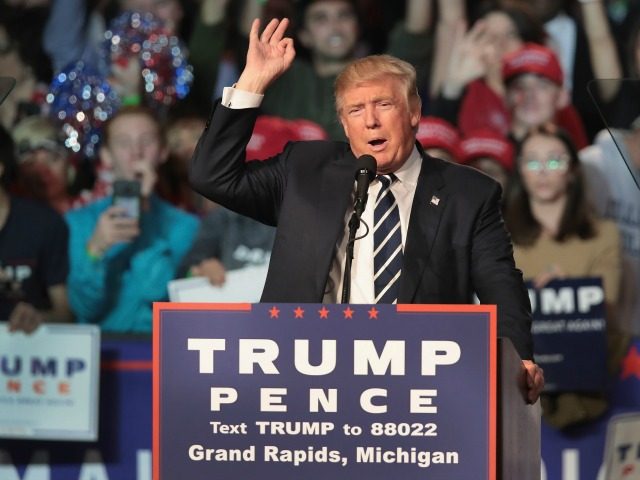Forty-six of the electoral college votes President-elect Donald Trump won on his way to a resounding 306 to 232 electoral college victory over Democrat nominee Hillary Clinton came from three states where his combined margin of victory was only 108,600 votes.
No major media outlet has yet called Michigan for Trump, but a spokesperson for the Michigan Secretary of State’s office told Breitbart News on Thursday “there’s no reason to believe there will be large numbers of votes that will be found subsequent to the current reporting.”
Trump won Pennsylvania, with its 20 electoral college votes, by 68,236 votes, Wisconsin, with its 10 electoral college votes, by 27,257 votes, and Michigan, with its 16 electoral college votes, by 13,107 votes.
Had those 108,600 votes gone to Hillary Clinton, she would have won the presidency with a a 278 to 260 electoral college victory over Trump. (Though New Hampshire, with its 4 electoral college votes has not yet been called, Clinton holds a 1,614 vote margin there–0.2 percent of votes cast in the state– with 100 percent of precincts reporting.)
Clinton won the popular vote by 0.2 percent, or about 200,000 votes out of a total of 120 million total votes cast.
A key shift of less than 0.1 percent of those votes–108,600–would have given us President-elect Clinton instead of President-elect Trump.
Clinton’s inattention on the campaign trail to these three “Rust Belt” states cost her dearly.
As The Week, points out, Hillary Clinton failed to visit Wisconsin, even once, after April.
It could have been even worse for the Clinton campaign. Trump, who only visited Minnesota once during the last month of the campaign (an overflow rally held Sunday at the Minneapolis airport), almost won that traditionally liberal state’s 10 electoral college votes as well.
The final tally there gave Clinton only a 42,951 vote victory–1.4 percent of the votes cast in the state. Sources in Minnesota tell Breitbart News that Trump may well have won the state had he held an additional campaign rally in Duluth during the last week of the campaign.
Over the last month of the campaign, in contrast, Trump visited Pennsylvania and Michigan numerous times. By the time the Clinton campaign realized those two states were in play, it was too late to catch up, a realization that may not have completely been understood by the Clinton campaign until early Wednesday morning when the networks called Pennsylvania for Trump, putting him over the top and making him President-elect.
“Political experts insisted that it was folly for Trump and his team to believe Michigan and Wisconsin were within their grasp. Pennsylvania was also said to be fool’s gold for Republicans every four years. Trump’s team ignored them—and struck a rich vein across the Rust Belt,” Carl Cannon wrote at Real Clear Politics on Thursday after the shock of Trump’s victory began to set in.
Trump’s team understood a number of things about these Rust Belt states the Clinton team missed.
First, the anger at the loss of manufacturing jobs was much greater than the Clinton team ever realized. Opposition to NAFTA, which Trump pointed to as one of the major causes of these job losses, resonated with blue collar voters.
Second, the National Rifle Association mounted a very aggressive and effective get-out-the-vote effort on Trump’s behalf in Ohio, Pennsylvania, Michigan, and Wisconsin.
Third, Clinton’s support for increasing the number of Syrian refugees by 550 percent, and the number of refugees overall, was very unpopular with middle-class voters, especially in Michigan and Minnesota. Trump’s promise to suspend the Syrian refugee resettlement program if elected, as well as the resettlement of refugees from countries that were hostile to voters, motivated many Rust Belt voters to back him.
Trump’s call for an end to the resettlement of refugees without the support of local communities during his Sunday rally in Minneapolis served to emphasize the difference between the two candidates at the very moment that the last few undecided Rust Belt voters were making up their minds.

COMMENTS
Please let us know if you're having issues with commenting.